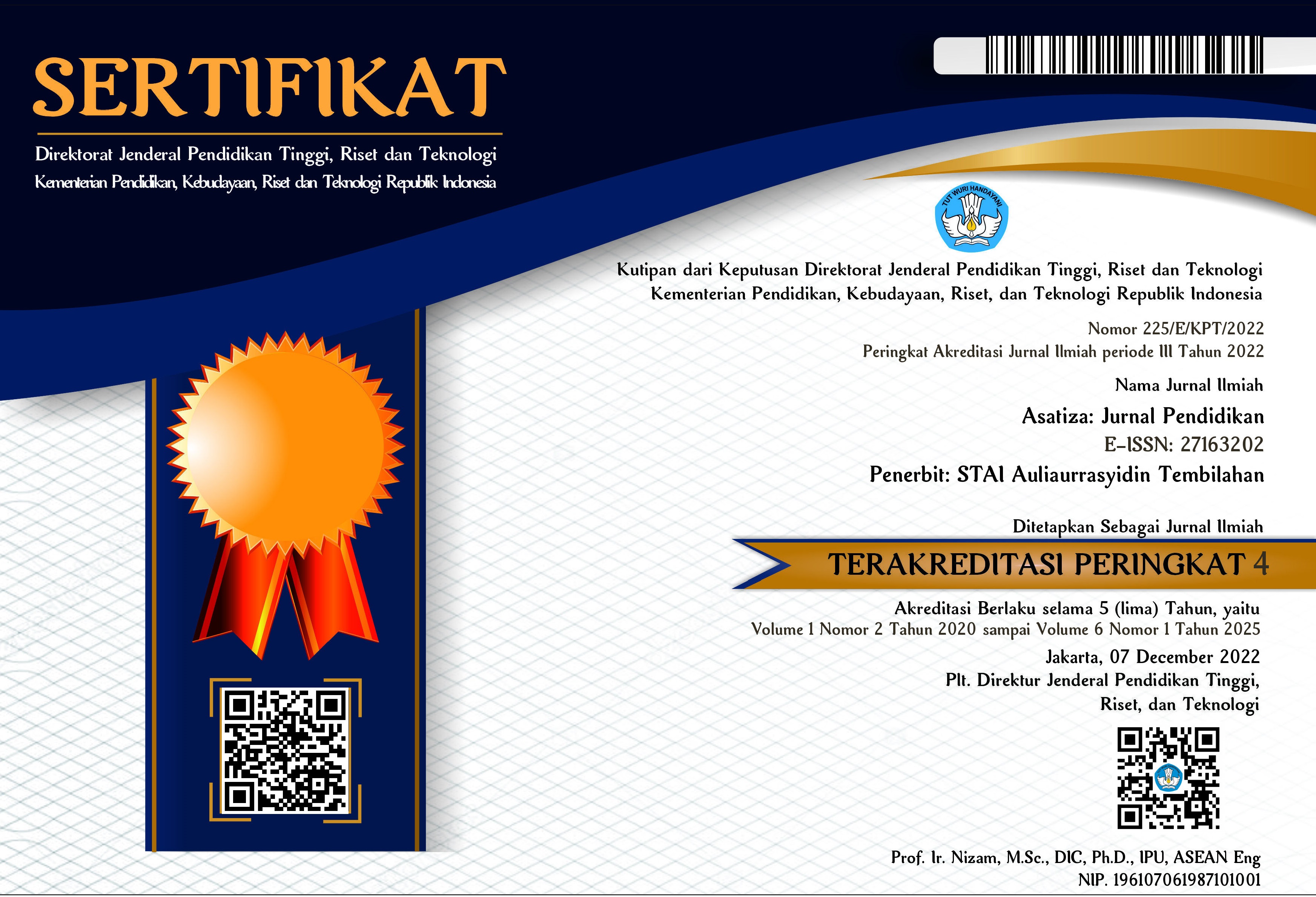Lecturer’s Feedback and Students’ Writing Performance: Social Constructivism Perspective
DOI:
https://doi.org/10.46963/asatiza.v2i3.389Keywords:
Feedback, Writing, Social ConstructivismAbstract
EFL writing as the form of productive skill has been the main issue for university students in Indonesia. Therefore, to maintain EFL students to be a good writer, lecturer’s feedback is necessary. The aims of this study were to find out whether there is any relationship between lecturer’s feedback and students’ writing performance, and to find out in what ways the lecturer’s feedback given seen from social constructivism. The researcher employed mixed method which took the data from 60 third-semester students in two Essay Writing Classes, and it was collected by using questionnaire, students’ writing score, and interview guide. The findings showed that correlation coefficient was .273 which indicates that the correlation between lecturer’s feedback and students’ writing performance was positive. While, seen from the significant level, it showed the number .042 which means there was statistically significant relationship between those two variables. The qualitative finding asserted that the lecturers always gave feedback frequently in the two forms, both were oral and written feedback. Other than that, although only one of the lecturers who used elaborated feedback, they both provide the assistance and objectivity during the assessment process. Based on the results of this study the lecturers must give feedback continuously towards students’ work and it should be given together with an explanation. Moreover, the future researcher can find the similar topic from another learning theory such as behaviorism or cognitivism.
Downloads
References
Adisca, F. A., & Mardijono, J. J. (2014). Written corrective feedback and its effects on english department students’ writing drafts. Kata Kita, 2(2), 33-40. retrieved on April 11th2020 from http://katakita.petra.ac.id/index.php/sastra-inggris/article/view/3956/3615
Aljohani, M. (2017). Principles of “constructivism” in foreign language teaching. Journal of Literature and Art Studies, 7(1), 97-107. http://doi.org/10.17265/2159-5836/2017.01.013
Ampa, A. T., & Quraisy, H. (2018). Needs analysis of the English writing skill as the base to design the learning materials. SHS Web of Conferences, 42, 00050. https://doi.org/10.1051/shsconf/20184200050
Aridah, A. (2003). The role of feedback in the teacidng and learning of writing. Celt: A Journal of Culture, English Language Teaching & Literature, 3(2), 105-114. https://doi.org/10.24167/celt.v3i2.1089
Ariyanti, A., & Fitriana, R. (2017). EFL students’ difficulties and needs in essay writing. Advances in Social Science, Education and Humanities Research (ASSEHR), 158, 111-121. https://dx.doi.org/10.2991/ictte-17.2017.4
Assessment Writing Test – Evaluation Criteria and Sample Topics. (2015). California Institute of Advanced Management. Retrieved on October, 21th 2019 from www.ciam.edu
Bijami, M., Pandian, A., & Singh, M. K. M. (2016). The Relationship between teacher's written feedback and student's' writing performance: Sociocultural perspective. International Journal of Education and Literacy Studies, 4(1), 59-66. https://www.journals.aiac.org.au/index.php/IJELS/article/view/2266
Brown, H. D. (2000). Principles of Language Learning and Teaching: Fourth Edition. New York: Addison Wesley Longman, Inc.
Colasante, M. (2011). Using video annotation to reflect on and evaluate physical education pre-service teaching practice. Australasian Journal of Educational Technology, 27(1). 66-88. https://doi.org/10.14742/ajet.983
Corbalan, G., Kester, L., & van Merriënboer, J. J. G. (2009). Dynamic task selection: Effects of feedback and learner control on efficiency and motivation. Learning and Instruction, 19(6), 455–465. https://doi.org/10.1016/j.learninstruc.2008.07.002
Cresswell, J. (2012). Educational Research: Planning, Conducting, and Evaluating Quantitative and Qualitative Research 4th Edition. Boston: Pearson Education, Inc.
Eslami, E. (2014). The effects of direct and indirect corrective feedback techniques on EFL students’ writing. Procedia-Social and Behavioral Sciences, 98, 445-452. https://doi.org/10.1016/j.sbspro.2014.03.438
Essays, UK. (2018). What Is An Essay. Retrieved from https://www.ukessays.com/resources/undergraduate/essay/what-is-an-essay.php?Vref=1
Fraenkel, J. R. (2012). How to Design And Evaluate Research In Education. New York: The McGraw-Hill Companies, Inc.
Fund, Z. (2010). Effects of communities of reflecting peers on student‐teacher development–including in‐depth case studies. Teachers and Teaching: theory and practice, 16(6), 679-701. https://doi.org/10.1080/13540602.2010.517686
Gibbs, G., & Simpson, C. (2005). Conditions under which assessment supports students’ learning. Learning and teaching in higher education, 1, 3-31. http://eprints.glos.ac.uk/id/eprint/3609
Hamamah, H. (2016). Exploring current online resource suitable for developing academic writing skills in English for EFL learners. Proceedings of International Conference on Language, Literary and Cultural Studies (ICON LATERALS), 792-803. https://doi.org/10.217716/ub.icon_laterals.2016.001.1.54
Harmer, J. (1998). How to Teach English. England: Addison Wesley Longman Limited
Ismail, N., Maulan, S., & Hasan, N. H. (2008). The impact of teacher feedback on ESL students’ writing performance. Academic Journal of Social Studies, 8(1), 45-54.
Klimova, Blanka. 2011. Evaluating writing in English as a second language. Procedia: Social and Behavioral Sciences, 28, 390-394. https://doi.org/10.1016/j.sbspro.2011.11.074
Narciss, S., & Huth, K. (2006). Fostering achievement and motivation with bug-related tutoring feedback in a computer-based training for written subtraction. Learning and Instruction, 16(4), 310-322. https://doi.org/10.1016/j.learninstruc.2006.07.003
Nicol, D. (2014). Guiding principles for peer review: Unlocking learners’ evaluative skills. Advances and innovations in university assessment and feedback, 197-224.
O'Mahony, T. (2017). The impact of a constructivist approach to assessment and feedback on student satisfaction and learning: a case-study. All Ireland Journal of Higher Education, 9(2). 2871-28719. https://ojs.aishe.org/index.php/aishe-j/article/view/287/519
Pourmandnia, D., & Behfrouz, B. (2014). Constructive-feedback: an educational district forma theory to practice in ELF teacher education. International Letters of Social and Humanistic Sciences, 41, 123-137.
Pratiwi, W. D. 2013. Students’ perception towards teacher’s written feedback among 11th grade students at SMAN 1 Wedi Klaten. Unpublished Undergraduate Thesis. Yogyakarta: Universitas Negeri Yogyakarta.
Rowe, A. D., & Wood, L. N. (2008). Student perceptions and preferences for feedback. Asian Social Science, 4(3), 78-88.
Sarwono, J. (2012). Metode Riset Skripsi Pendekatan Kuantitatif Menggunakan Prosedur SPSS (Edisi Pertama). Jakarta: PT Elex Media Komputindo.
Setyowati, L., & Sukmawan, S. (2016). EFL Indonesian Students' Attitude toward Writing in English. Arab World English Journal (AWEJ), 7(4). 365-378. https://dx.doi.org/10.2139/ssrn.2898636
Thurlings, M., Vermeulen, M., Bastiaens, T., & Stijnen, S. (2013). Understanding feedback: A learning theory perspective. Educational Research Review, 9, 1-15. https://doi.org/10.1016/j.edurev.2012.11.004
Van der Kleij, F. M., Eggen, T. J., Timmers, C. F., & Veldkamp, B. P. (2012). Effects of feedback in a computer-based assessment for learning. Computers & Education, 58(1), 263-272. https://doi.org/10.1016/j.compedu.2011.07.020
Wahyuni, S. (2017). The Effect of different feedback on writing quality of college students with different cognitive styles. Dinamika Ilmu, 17(1), 39-58. http://dx.doi.org/10.21093/di.v17i1.649
Weaver, M. R. (2006). Do students value feedback? Student perceptions of tutors’ written responses. Assessment and Evaluation in Higher Education, 31(3), 379–394. http://dx.doi.org/10.1080/02602930500353061.
Winstone, N. E., Nash, R. A., Parker, M., & Rowntree, J. (2017). Supporting learners' agentic engagement with feedback: A systematic review and a taxonomy of recipience processes. Educational Psychologist, 52(1), 17-37. https://doi.org/10.1080/00461520.2016.1207538
Downloads
Published
Issue
Section
License
Authors who publish with this journal agree to the following terms:
1. Copyright on any article is retained by the author(s).
2. The author grants the journal, right of first publication with the work simultaneously licensed under a Creative Commons Attribution shareAlike 4.0 International License that allows others to share the work with an acknowledgment of the work’s authorship and initial publication in this journal.
3. Authors are able to enter into separate, additional contractual arrangements for the non-exclusive distribution of the journal’s published version of the work (e.g., post it to an institutional repository or publish it in a book), with an acknowledgment of its initial publication in this journal.
4. Authors are permitted and encouraged to post their work online (e.g., in institutional repositories or on their website) prior to and during the submission process, as it can lead to productive exchanges, as well as earlier and greater citation of published work.
5. The article and any associated published material is distributed under the Creative Commons Attribution-ShareAlike 4.0 International License











2.png)



